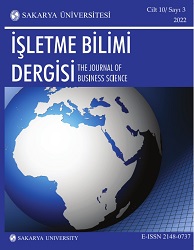Determinants of Bank Lending and Credit Accessibility of Micro, Small and Medium Enterprises
Determinants of Bank Lending and Credit Accessibility of Micro, Small and Medium Enterprises
Author(s): Adeshola Olugbenga OlunugaSubject(s): Economic development, Financial Markets
Published by: Sakarya üniversitesi
Keywords: Determinants of Bank Lending; Credit Accessibility; MSMEs Growth; Commercial Banks; Economic Development;
Summary/Abstract: Aim: The aim of the study is, besides other things, to establish the extent in which determinants of bank lending are implemented in association with the performance of micro, small and medium enterprises in Nigeria. Method: The study applied the econometrics method of data analysis. Secondary data for the research were gathered from the Central Bank of Nigeria's Statistical Bulletin, which has a long history of providing accessible, adequate, accurate, and reliable data. Multiple regression analysis was used in conjunction with Stata software. Findings: The study shows that bank size has a significant influence on bank lending to MSMEs, the regression coefficient further reveals that bank size is negatively associated with bank lending to MSMEs, this implies that an increase in bank size will not always bring about an increase in bank lending to MSMEs. The finding also shows that credit risk and bank liquidity have a significant influence on bank lending to MSMEs, the regression result further reveals that credit risk is negatively associated with bank lending to MSMEs, thus implying that an increase in credit risk will cause a decrease in lending to MSMEs in the same vein liquidity ratio was found to be positively related to bank lending to MSMEs, thus implying that higher liquidity ratio will propel higher bank lending to MSMEs. Finally, the finding shows that the volume of deposits and interest rates have a significant relationship with bank lending to MSMEs. The regression result further reveals that interest rate is negatively associated with bank lending to MSMEs, thus implying that an increase in interest rate will cause a decrease in bank lending to MSMEs. In the same vein volume of deposits was found to be positively related to bank lending to MSMEs, thus implying that an increase in the volume of deposits will cause an increase in bank lending to MSMEs Results: The study concluded that the determinants of bank lending have an effect on the access to capital and the development of MSMEs in Nigeria. The research suggested that banks should develop an alternative financing strategy that would alleviate lending constraints to MSMEs. This is because MSMEs are subjected to strict terms and conditions by banks, prompting them to seek other sources of funding that may be insufficient to finance their operations and ensure their survival.
Journal: İşletme Bilimi Dergisi
- Issue Year: 10/2022
- Issue No: 3
- Page Range: 299-313
- Page Count: 15
- Language: English

